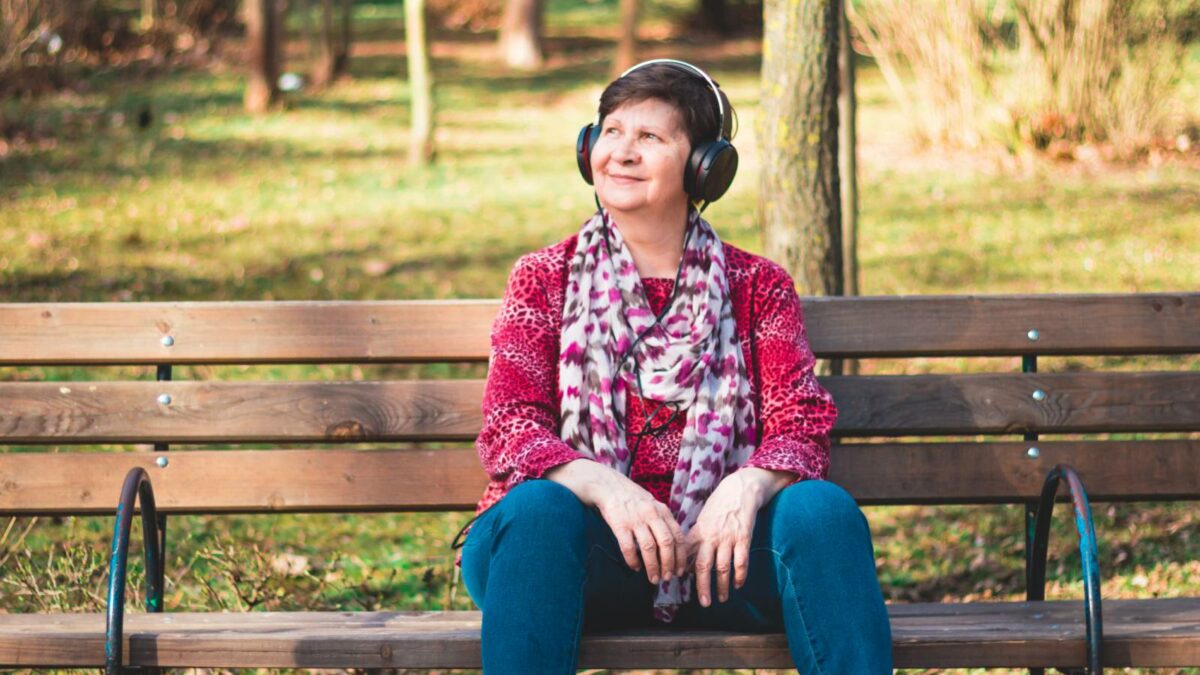The Benefits of Music for People with Alzheimer’s and Other Forms of Dementia

Think about a song you knew when you were younger but haven’t heard in years. The song comes on and suddenly you remember the words and the melody. You may also be flooded with snippets of memories — a particular person, moment, or period in your life — you hadn’t thought about until you heard the song again.
According to studies, listening to music engages broad neural networks in the brain, including brain regions responsible for motor actions, emotions and creativity. That may help explain why music can offer numerous benefits for people with Alzheimer’s and other forms of dementia. The study showed that the part of the brain activated by music is located in the medial prefrontal cortex region, one of the last areas of the brain to atrophy over the progression of Alzheimer’s disease.
Understanding the Benefits of Music for Alzheimer’s and Other Types of Dementia
According to the National Association of Music Merchants (NAMM) Foundation, for older adults in general there’s a lot of positive power in music:
- A study of 30 people over 80 years of age with depression found that participants in a weekly music therapy group were less anxious, less distressed and had higher self-esteem.
- Cognitive and neural benefits of musical experience continue throughout the life span, and counteract some of the negative effects of aging, such as memory and hearing difficulties in older adults.
- Adults 60 to 85 without previous musical experience exhibited improved processing speed and memory after just three months of weekly 30-minute piano lessons and three hours a week of practice, whereas the control group showed no changes in these abilities.
Specifically for older adults with memory loss due to Alzheimer’s or other forms of dementia, music can not only stimulate parts of the brain; it can also improve memory. Those aren’t music’s only advantages, either. Research is starting to reveal the five major benefits of music for Alzheimer’s and other forms of dementia:
- Music may lower biological markers of stress in older adults with dementia.
- Passively listening to favorite music was effective in reducing anxiety levels in a group of residents living in a memory care community.
- Music can improve duration and quality of sleep in older people with dementia.
- Music therapy, as opposed to simply listening to music, can help manage dementia-related behavioral symptoms.
- Music therapy coupled with physical therapy showed modest cognitive benefits of music therapy in people with dementia.
Take another look at those last two bullets. They both mention music therapy, which involves something entirely different than simply listening to music. But what is music therapy, and how can it specifically benefit older adults with memory loss due to Alzheimer’s and other dementias?
Music Therapy for Dementia
According to the American Music Therapy Association, the official definition of music therapy is “the clinical and evidence-based use of music interventions to accomplish individualized goals within a therapeutic relationship by a credentialed professional who has completed an approved music therapy program.”
In other words, music therapy is a health care discipline using research-based techniques to help improve an individual’s health and wellness. Techniques can include playing instruments, listening to specific types of music, writing songs, discussing lyrics, dancing, creating music, or going through relaxation exercises while listening to music.
Music therapy interventions can help manage stress, alleviate pain, express feelings, enhance memory and improve communication — all things that benefit someone with dementia.
Types of Music Therapy at Friendship Village
Some dedicated memory care communities, including the Memory Care community at Friendship Village, have highly trained memory care professionals on staff to provide the most advanced memory care to residents.
At Friendship Village, residents living with Alzheimer’s or another form ofdementia or memory loss can participate in MUSIC & MEMORY®, a program where specialists hold private and group sessions, tracking residents’ progress by recording mood trends before and after sessions. One type of session may involve creating personalized playlists that offer an effective, non-pharmacological approach to improving quality of life and care.
Another memory care program you’ll find at Friendship Village is It’s Never Too Late®, or IN2L. This innovative touch screen computer system is programmed with activities, games, therapy, reminiscing, music, virtual travel and more. IN2L is an easy way for residents to stay directly connected with family, friends, and the world around them.
Learn more about Friendship Village’s person-centered memory care
At our Friendship Village Chesterfield and Friendship Village Sunset Hills locations near St. Louis, Missouri, you’ll find person-centered memory care delivered in a family setting. Our Memory Care team members are certified as Montessori Dementia Care Professionals and focus on the individual needs of each resident.
We’re a faith-based, not-for-profit senior living community that provides life-enriching activities and events to provide residents with the highest quality of life. We invite you to contact us to learn more about how we incorporate music and music therapy into our unique Memory Care programming.


